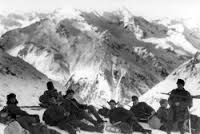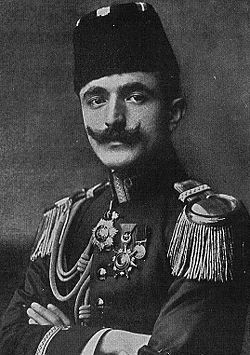Two Different Faces of God at War in the Caucasus.
Turkey Unprepared for Winter War; Not So Russia.
Special to The Great War Project
(29-30-31 December) The German plot to ignite a holy war against the British and Russians in the Middle East and Central Asia is so far a failure.
But in the rugged mountains of eastern Turkey and the Caucasus, “two different faces of God were in conflict,” reports historian Martin Gilbert, “as Russian Christian and Turkish Muslim troops faced each other in a bitter struggle.”
Initially, Russian troops press their way onto Turkish territory, but as freezing winter temperatures and deep snows grip the mountain passes, the Ottoman army slowly forces the Russians off of Turkish land.
The Turks are loathe to experience a setback – another one — but the possibility is real, this time in the Caucasus.
In the first months of the war as Turkey, now in the war on the German side, gradually takes the battlefield, “the Turks suffered two severe blows,” writes the popular British historian Peter Hopkirk. Both involve the Holy War that the Germans desire, that the Ottomans declare, but which fail.
The Turkish plans are the grandiose dream of Enver Pasha, the Turkish Minister for War. It has long been his ambition “to recover from Tsarist Russia the lost Ottoman provinces in the Caucasus. When he had done that and liberated the Turkish peoples there,” Hopkirk writes, “he planned to march eastwards into Tsarist Central Asia and carve out a great new Muslim Empire.”
And, reports Hopkirk, Enver’s ambitions do not end there. To the southeast glistens the jewel in the crown, British India, and Enver “has a hankering for that too.”
The first step in this grand plan is “to expel the Russians from the Caucasus, and what better time than now when they were being hard-pressed by the Germans on the Eastern Front.”
The Germans are skeptical of Enver’s plans, but they encourage him nevertheless, reports Hopkirk, “for his grandiose plan promised to divert Russian units to the Caucasus, thus relieving the pressure on themselves on the Eastern Front.”
Enver believes himself to be a grand strategist and commander. He leaves Constantinople for eastern Turkey to take personal command of the Turkish army there. Despite the freezing temperatures and snowbound mountain passes, Enver insists, “the Russian army must be annihilated now.”
The Turkish commander on the scene urges Enver to wait out the winter and resume fighting in the spring of 1915.
The stance of the Turkish general in command enrages Enver, and he sacks him. He then takes personal command of the Turkish army there, renaming it the Army of Islam to reflect, Hopkirk notes, “the momentous role he intended it to play in the Holy War and, ultimately in redrawing the map of Asia.”
“It was during the struggle on the Caucasus Front, at Sarikamish,” Gilbert writes, “that the two armies became locked in a ferocious battle.” Enver has more troops than the Russians, but the Russians have better supply lines.
Enver’s troops are not prepared for winter warfare; the Russians are.
Enver believes that if his army is victorious at Sarikamish, the entire Russian front will collapse. “Everything,” Hopkirk writes, “depended on the coming battle for Sarikamish.”
The Russians are desperate to hold on to their positions. They ask their ally Britain for help, for some action that will draw away Turkish troops from the Caucasus.
Consequently the British command begins an evaluation of the effectiveness of a naval attack on Turkish forts in the Dardanelles — the straits in southwest Turkey, far from the Caucasus, that lead from the Mediterranean to Constantinople.


